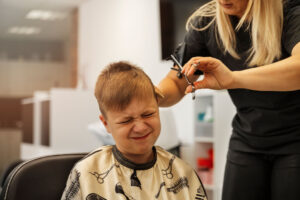The best sport for children with language delays, Autism Spectrum Disorder (ASD), and Attention-Deficit/Hyperactivity Disorder (ADHD) is one that encourages communication, social interaction, and physical development, while also considering the child’s sensory needs and ability to focus. According to research from fields such as speech pathology, Applied Behavior Analysis (ABA), and occupational therapy, structured, individualized sports can support development in children with these challenges.
Swimming
Swimming is widely recommended for children with ASD, ADHD, and language delays. Studies show that swimming helps regulate sensory input, which can be beneficial for children who are overstimulated or under-stimulated by their environment. The rhythmic, repetitive motions in swimming can have a calming effect on children with ADHD, and the individual focus of the sport allows them to develop at their own pace without direct competition.
For language development, swimming classes can foster social skills in group settings. Children can practice following directions, learning new vocabulary related to the sport, and engaging in cooperative activities with peers, which speech pathologists often highlight as beneficial for language acquisition.
Martial Arts
Martial arts, such as karate or taekwondo, are recommended for children with ASD and ADHD due to their structured environment, which promotes self-discipline, attention, and respect for rules. The predictable routines can help children with ASD feel comfortable, while the physical activity helps channel the hyperactivity often seen in children with ADHD.
Speech pathologists and BCBAs often find martial arts helpful in building executive functioning skills, such as following multi-step directions. It also encourages eye contact, listening skills, and turn-taking, which are crucial for both language development and social interactions.
Horseback Riding (Therapeutic Riding or Hippotherapy)
Horseback riding, particularly in therapeutic settings, has been shown to improve social communication, motor skills, and sensory integration in children with ASD and ADHD. Occupational therapists recommend horseback riding because it provides vestibular and proprioceptive input, which helps children regulate their body awareness and balance.
From a speech therapy perspective, horseback riding can be used to practice verbal commands, improve language comprehension, and enhance social interaction. Children learn to communicate with the horse, follow directions from instructors, and engage with peers in a controlled, predictable environment.
Gymnastics
Gymnastics is another sport that helps children with language delays, ASD, and ADHD develop motor planning, strength, and coordination. It is often recommended by occupational therapists because it improves body awareness, spatial skills, and sensory regulation.
BCBAs and speech pathologists see gymnastics as beneficial for language and social development because it provides structured routines, opportunities to practice listening skills, and moments of peer interaction. Children can learn to follow group instructions, take turns, and engage in cooperative activities—all important for communication and social skill development.
Soccer
For children who are ready to engage in team sports, soccer can be a good option. Occupational therapists recommend soccer because it improves coordination, motor planning, and physical endurance. For children with ADHD, it allows them to release energy while learning to focus on a shared goal.
Speech pathologists often find soccer beneficial for children with language delays because it encourages communication and teamwork. Children must communicate with teammates, follow verbal instructions, and understand the rules of the game. BCBAs see value in the opportunities for social skill building and cooperation, especially when paired with social stories or visual supports that help children understand the flow of the game.
Each child with ASD, ADHD, and language delays is unique, and the best sport for them will depend on their individual needs, interests, and sensory profile. However, research shows that sports like swimming, martial arts, horseback riding, gymnastics, and soccer offer a balance of physical activity and social opportunities that can support both language development and behavioral growth. Collaborating with professionals like speech pathologists, BCBAs, and occupational therapists can help tailor these sports to meet the specific developmental goals of each child.


